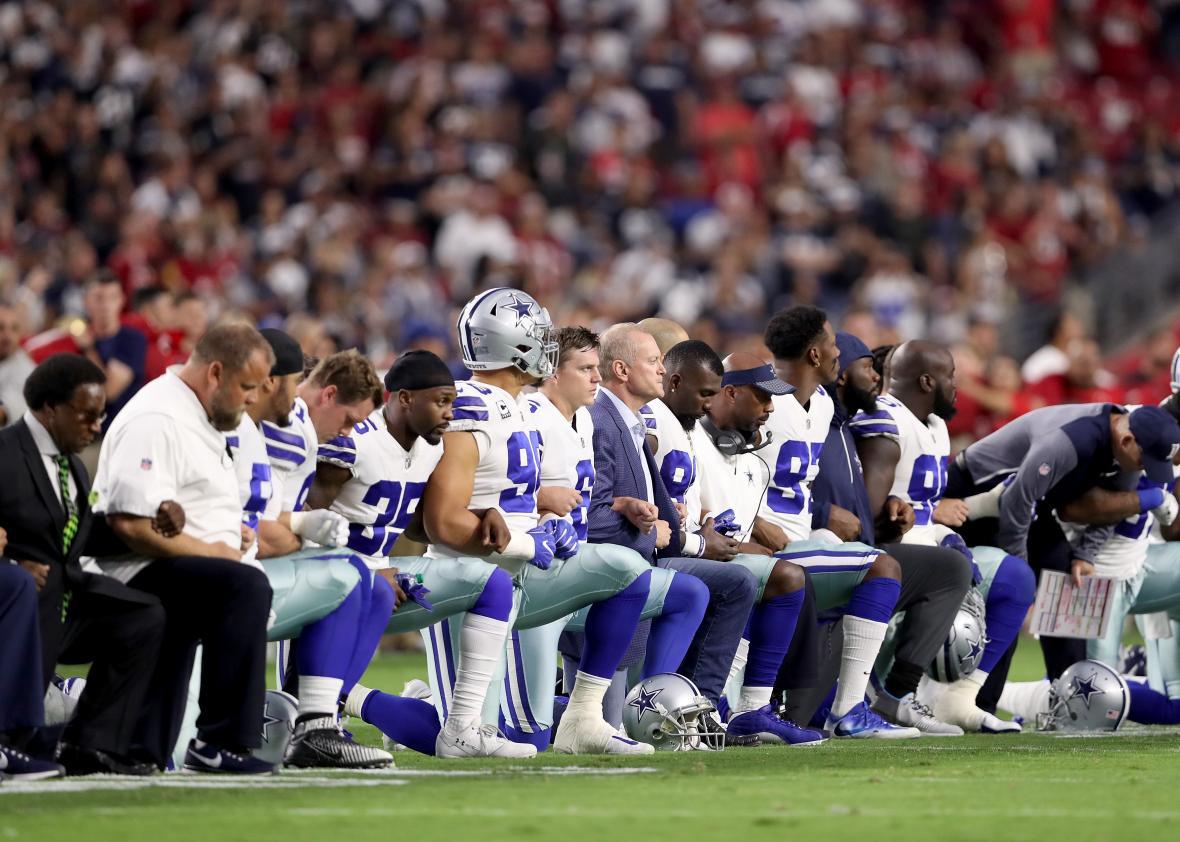On Thursday, Waylon Bates, the principal of Parkway High School in Louisiana, announced in a letter that student athletes would be prohibited from kneeling during the national anthem. These athletes, Bates wrote, must “stand in a respectful manner” throughout the anthem or risk “loss of playing time” and “removal from the team.” But “taking a knee” is a form of protest against institutional racism and police brutality. Can public schools like Parkway constitutionally bar students from political expression in this manner?
No. Absolutely not. It’s not even close. Indeed, Bates’ decree is almost comically unconstitutional.
This issue was settled in 1943’s West Virginia State Board of Education v. Barnette, when the Supreme Court ruled that public schools cannot compel Jehovah’s Witnesses to salute the flag during the pledge of allegiance. In his iconic opinion, Justice Robert H. Jackson explained that “symbolism is a primitive but effective way of communicating ideas” that deserves robust First Amendment protection. He then dismissed the notion that public schools may force students to express symbolic patriotism—in an admonition that Bates would do well to heed:
To believe that patriotism will not flourish if patriotic ceremonies are voluntary and spontaneous instead of a compulsory routine is to make an unflattering estimate of the appeal of our institutions to free minds. … [F]reedom to differ is not limited to things that do not matter much. That would be a mere shadow of freedom. The test of its substance is the right to differ as to things that touch the heart of the existing order.
In perhaps the most famous passage in all First Amendment jurisprudence, Jackson also laid down the core free speech principle, one that applies equally to Jehovah’s Witnesses during World War II and Parkway students today:
If there is any fixed star in our constitutional constellation, it is that no official, high or petty, can prescribe what shall be orthodox in politics, nationalism, religion, or other matters of opinion or force citizens to confess by word or act their faith therein. If there are any circumstances which permit an exception, they do not now occur to us.
Barnette alone demonstrates why Bates’ threat is egregiously unconstitutional. But in case there is any lingering doubt, the Supreme Court reaffirmed and clarified the First Amendment rights of public school students in 1969’s Tinker v. Des Moines Independent Community School District. In Tinker, a public school had suspended several students for wearing black armbands to class in protest of the Vietnam War. The students challenged their suspension, and the Supreme Court held that, as a general rule, public schools may not censor students’ political expression. These students, the court asserted, do not “shed their constitutional rights to freedom of speech or expression at the schoolhouse gate.” As this language suggests, Barnette and Tinker apply to school-sponsored on-campus activities (like sports), not merely to the classroom.
Tinker made exceptions for expression that “materially disrupts classwork” or “involves substantial disorder or invasion of the rights of others.” Perhaps in a sop to this section, Bates’ letter implied that taking a knee would somehow be “disruptive.” It’s difficult to see how brief, silent protest could be disruptive at all, but regardless, it is certainly not disruptive within the meaning of Tinker. Sure, some observers and players may be irate. But the Tinker test focuses on disruption caused by speakers, not disruption caused by those who react to them.
Nearly 75 years of celebrated precedent prove that Bates is censoring his student-athletes in violation of the First Amendment by attempting to forbid them from taking a knee. There is no room for debate on this point. The Constitution flatly bars Parkway High School from prohibiting this form of political expression. No official, high or petty, can prevent these students from kneeling during the anthem. It really is that simple.
